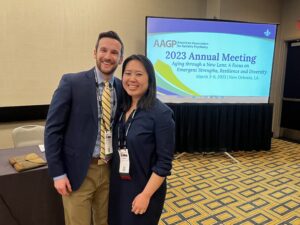Mentorship
 Although mentorship can be formal or informal, we have established more formalized, opt-in mentorship opportunities to develop reciprocal and collaborative relationships based on commonality, confidentiality, and a meaningful commitment. In a formal mentoring relationship, there are actionable and measurable procedures, as well as specific and defined goals with timelines to build the mentee’s capabilities with the goal of cultivating a mentee’s growth, learning, and career development.
Although mentorship can be formal or informal, we have established more formalized, opt-in mentorship opportunities to develop reciprocal and collaborative relationships based on commonality, confidentiality, and a meaningful commitment. In a formal mentoring relationship, there are actionable and measurable procedures, as well as specific and defined goals with timelines to build the mentee’s capabilities with the goal of cultivating a mentee’s growth, learning, and career development.
At UCLA, we have many mentorship opportunities available within the residency program. We believe mentorship is a key component of professional development and strive to support the wide variety of backgrounds and career interests of our residents. Several different, formalized opportunities for mentorship include:
- Core Mentorship Program. Our residency features a Core Mentorship Program spearheaded by Westwood Track Director Dr. Sarah Nguyen, which is a general opt-in mentorship program to support the overall professional development of the resident through quarterly one-on-one relationships with department faculty. Mentorship within this program encompasses a range of topics, including but not limited to career development; goal setting and accountability; skill-building; leadership development; networking and relationship-building; work-life balance; feedback and reflection; personal and professional growth; project debriefing; transitioning to a new role; skill assessment and development, etc.
- PCFA Resident Mentoring Program. An additional opt-in mentorship program with volunteer clinical faculty in the community known as the Psychiatry Clinical Faculty Association (PCFA) Resident Mentoring Program. Many of these faculty have more experience in private practice and non-academic practice settings as well as various psychotherapy modalities. PCFA mentors can help you navigate residency, work-life balance, fellowship/job and career planning, complex workplace dynamics, organizational challenges, interesting books/films, or any other topic that is helpful to you in your trajectory as a resident in the program. PCFA mentors are also very helpful in assisting mentees with thinking through situations that may occur in residency that are not easy or comfortable to discuss with program administrators or attendings, as they provide a neutral and outside perspective on residency and training in general.
- Concentration-Specific Mentoring. In addition, many concentrations and groups within the residency, such as the Community and Global Psychiatry (CGP) and Clinician Educator Concentrations, have internal mentorship programs that they offer for residents interested in those specific areas.
In addition to these mentorship programs, Dr. Nguyen has developed a complementary professional identity formation curriculum that incorporates experiential learning through an iterative process in PGY-1, 2, and 3. This year long, quarterly series addresses the unique challenges and learning opportunities that contribute to the overall development of self, both professionally and personally.
